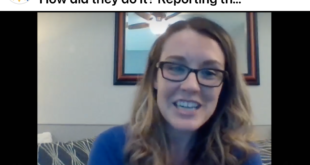With the vast and unprecedented power of the internet to share news comes vast and unprecedented power also to shape the news people actually see.
In this thoughtful piece for the Columbia Journalism Review, Trevor Timm explores the relationship between a major newspaper like the New York Times and social media empire Facebook — a relationship, he says, that ‘has the potential to rob news organizations of their soul.’
 It’s the age-old question of the separation of the newsroom from the advertising department.
It’s the age-old question of the separation of the newsroom from the advertising department.
It’s faced at the one-person weekly newspaper, where the editor/salesman must decide whether to piss off the mayor who also owns the grocery store running a full-page ad every week. It’s faced by every publisher who must navigate between his hard-charging newsroom and the Chamber of Commerce luncheon he attends on Tuesdays.
But the scope here, as Timm notes, is huge:
‘Standard Oil or Pfizer or General Motors never had the power to ensure millions of New York Times subscribers would not get their paper the next day. Yet with one click, Facebook could pull off the modern-day equivalent.’
Yes, online newspapers and journalism-oriented sites make for thousands of choices each day for where we get our news. The good ol’ days of having — for the true news junkie — three or four newspapers delivered to the front stoop have been replaced by the wonders of the free marketplace known as the internet.
Read three or four papers? How about 10 or 12, or hundreds? Go directly to the source. Choose whatever news organization is the most thorough or trustworthy. Or, if you wish, choose the organization that best reflects your own point of view so you’re never bothered by the ‘bias’ of bringing up both sides.
In fact, though, a generation of readers is doing very little choosing at all. By the millions, they are getting news as a byproduct of their social media engagement on, for example, Facebook.
And I’m not sure they understand how or why.
From Timm’s post:
Facebook is extremely meticulous about what content the public should see. Close watchers of the social media site know that most of the time you only see around 6 percent of what your friends post. For organizations who want their followers to see their posts, it’s even less. But most users don’t know this is happening. As Alexis Madrigal explained, more than 60 percent of users in one study “had no idea that there even was a filtering algorithm, let alone one that looks at more than a thousand data signals to determine what to show a user.”
The examples usually have to do with advertising. Want more people to see your post? Pay a bit extra.
The implications for political elections, however, are huge.
When I edited a newspaper, it was inevitable during the days leading up to an election that I would get at least a few phone calls like this: “Are you people asleep at the switch? There’s an election coming up Tuesday, and I haven’t seen anything in the paper about it!”
Of course, the newspaper had been covering the upcoming election for weeks. We thought the coverage had been exhaustive — and we were exhausted. But there were always a few people who simply hadn’t been paying attention because, well, they didn’t realize it might affect them.
I was often tempted in these conversations — and I may have said it a couple of times — to reply: Well, all we can do is write the news. We can’t come over to your house and read it to you.
Now, though, news organizations don’t have to come to your house. They can do it on your mobile phone, your tablet, your computer screen.
And if a politician wants to make sure you see that story about his opponent’s scandal, well, just elevate its exposure by paying a fee. Not enough people see the adorable picture of the candidate adopting a cat? Give it a bump.
To a degree, such tactics always have been possible. You could paper a neighborhood with flyers. More likely, you now flood the airwaves with attack ads — which everyone ignores or skips through.
But how will we tell that a ‘news story’ is being ‘promoted’ by social media. Will it be marked as advertising?
Let’s make no mistake. Facebook, Twitter, Google+ and the hundreds of others are not news organizations. The battles inside legitimate news organizations have sometimes been epic. People have quit. People have been fired. Publishers grew old before their time.
So who will stand up for journalistic integrity inside the Facebooks of the world? Who is willing to quit or be fired over independence from an advertiser’s pressure? Is anybody there to even make the argument?
And if not, will millions of readers notice or care?
 Nevada Press Association The best in Nevada journalism since 1924
Nevada Press Association The best in Nevada journalism since 1924


